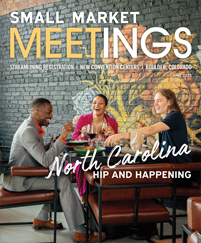Choosing a speaker for a group event can often elicit widely varied opinions. So rather than choosing a particular person, industry professionals suggest coming up with goals and criteria first.
Is the object of the session to entertain, to educate or to enlighten? What is the message you want to impart, and how and by whom is it best delivered? For example, it might be someone in the industry or a motivational speaker. Would a question-and-answer session in the second half be more productive or enjoyable?
Those are just some of the questions industry professionals suggest planners ask themselves before reaching out to a potential speaker through a CVB or a speakers bureau. We asked three industry veterans for some tips on booking better speakers for your events. Here’s what they had to say.
Consider Your Objectives
“Rather than saying, ‘I need a speaker,’ say, ‘Here are my event objectives, and here are the topics I think will support those objectives’ and ‘This is how much money I want to budget for that speaker,” said Brian Palmer, senior vice president of the National Speakers Bureau. “Then go out and find that speaker, having a vision of what you want and a basis for your selection. When you have a plan, your odds of the speaker accomplishing what you hope for go up.”
That plan could include helping breed cooperation among the group’s membership or imparting insights into a particular industry and its future.
“So, if it’s a group of plumbing contractors, the topic might be new regulations, legislation or the way small businesses are going to be taxed in the future,” said Palmer. “Or, say, they’re road construction; you know with the infrastructure bill, they’re going to be dealing with a lot more government contracts. Maybe the speaker would address how road builders or bridge builders might more effectively operate their business in the future.
“Your speakers can get that specific and informative,” he said.
Understanding the Value
Another consideration when choosing a speaker or deciding whether to have one is understanding the value a speaker can add to a meeting. Speakers, said Rich Gibbons, president of SpeakInc, set the tone, particularly among groups where these meetings are their only face-to-face contact.
“With organizations that are more virtual or more hybrid, the ethos of the organization is defined by in-person gatherings,” he said. “If you only see each other once or twice a year, that event is almost a stand-in for office talk.
“I think the speakers, to a great degree, help define the cadence and rhythm at the event,” he said. “There’s an awful lot of gravity around that in-person time. And by extension, the speakers do a lot to define the subtext and the vibe.”
David Buckenberger, senior vice president of business development with the Greater Lansing Convention and Visitors Bureau, said a vast majority of events they work with are local trade associations that often use speakers in one of two ways.
“The speakers are in place either as an educational component for continuing education credits in a particular field, or they’re there to drive interest, drive attendance and, ultimately, drive revenue,” he said.
For example, he said, a Michigan High School Football Coaches Association event coming in January is driven entirely on the quality, the number and the notoriety of the speakers they get.
“The vast majority of their people come to this event because of what they’ll learn from these speakers,” said Buckenberger. “In this case, their speakers are all usually nationally known football coaches who are coming to do presentations on different things, like recruiting, offensive/defensive schemes and so forth. You could probably put that into any industry per se because they need subject matter that’s going to be pertinent to their potential attendees.”
People want to leave an event feeling that they received value for their money, especially in times of austerity.
“Clearly, there are a lot of organizations, both trade association and corporate, that are minding their p’s and q’s right now,” said Gibbons. “They’re just being very judicious about how they make meaningful investments. They want to see a tangible return on that investment. And more often than not, it’s pragmatic, hard-hitting ways in which individual audience members can be better at what they do when they go back to their practice on Monday morning.”
Planning the Budget
When it comes to budgeting for a speaker, organizations have to be prepared to pay bigger money for bigger names. But big money does not always mean better speakers, said Palmer.
“There are some good speakers who charge close to $5,000, and there are some very, very mediocre speakers who charge $100,000,” he said. “But usually you can get some very good speakers who charge between just under $10,000 and $15,000. And there are all sorts of exceptions to that rule, as well. It’s not a sliding scale where the more the speaker costs, the better they are.”
Buckenberger said they often tap into Michigan State University and its pool of expertise. “There’s all sorts of departments and experts on a variety of topics,” he said. In addition, those speakers are local, which saves organizations money on travel, room and board. “But you still have to have the budget to pay for them and be able to show a return on investment; you need to have the right content for the audience.”
And although COVID continues to put some meetings on hiatus or move them to virtual platforms, the most successful speakers are those who can move between speaking to an audience they can see and speaking to one they can’t.
“A lot of speakers, start a program with their battery at 75%,” said Gibbons. “When they can see the audience thinking about their words or hear them laughing and there’s a connection, their batteries fill to 100%.”
It becomes a challenge when they are delivering that same content to a tiny webcam.
“There’s no human reflection of energy and feedback,” he said. “But there are some speakers who are able to deal with that awkward sociological component. I would say that the speakers who can deliver a live talk on Monday and remote on Tuesday and seamlessly migrate back and forth between the two channels and mediums are the ones who are successful in the marketplace right now.”












